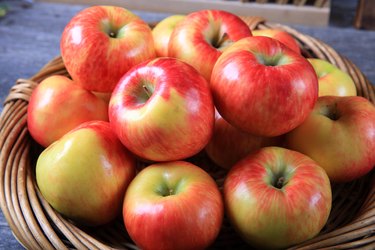
You know the age-old health aphorism: "An apple a day keeps the doctor away." Although no one food can keep disease at bay, apples are nutritious fruits that may help your weight-loss efforts and offer a variety of other health benefits. But should you really be eating an apple a day, or is it possible to get too much of a good thing and turn the advantages into disadvantages?
Apple Nutrition
Video of the Day
A large — about 3-1/4 inches in diameter — apple with the skin on it has 116 calories. It has very little protein or fat, with less than a gram of each, and 31 grams of carbohydrates. Of those carbs, over 5 grams are from fiber, making apples a high-fiber fruit.
Video of the Day
The same size apple is also a good source of vitamins and minerals. The vitamin C in one large apple is notable, fulfilling 11 percent of a man's daily requirement and 13 percent of a woman's. One large apple also gives you 5 percent of your daily requirement of the mineral potassium, which is associated with healthier blood pressure.
Benefits of Eating Apples
1. Weight Management
The fiber in one large apple provides you with a wealth of benefits. In one study, published in PloS One in 2015, adding apple fiber — a water-soluble type called pectin — to the diets of rats lowered their intake of food and helped decrease weight and body fat. The researchers concluded that apple pectin supports satiety and weight management.
2. Bowel Health
Getting adequate fiber also assists with bowel movements and keeps you regular and may improve your cholesterol levels, lowering your risk for heart disease and type 2 diabetes. There's some evidence, too, that fiber may help protect you from colon cancer, although more research is needed. Men need 38 grams of fiber daily for optimum health, and women need 25, so just one large apple will satisfy 13 to 20 percent of your daily requirement.
3. Fight Free Radical Damage
Apples are rich in antioxidants such as vitamin C, which help fight off free radicals, molecules that can damage DNA and make you susceptible to illnesses such as heart disease and cancer. A review of studies, published in the Annals of Oncology in 2005, reported that eating one or more apples daily helped protect subjects from many different types of cancer, including esophageal, breast, colon and ovarian.
In addition to vitamin C, apples contain antioxidant phytochemicals like quercetin, catechins and chlorogenic acid. In fact, the antioxidant activity of the compounds in apples is higher than that of many other fruits, such as grapes, strawberries, pears and oranges.
Disadvantages of Eating Apples
1. Possible Gas and Bloating
You will encounter a few downsides to eating apples every day. If you aren't accustomed to eating fiber, suddenly embarking on a regimen of eating apples every day may lead to uncomfortable gas and bloating. Add fiber from apples and other foods to your diet gradually, phasing it in over a few weeks, and make sure to drink plenty of water to help the fiber pass through your digestive tract.
2. Apple Allergy
Some people are allergic to apples and related fruits. If you have an allergy to birch pollen, you may develop an allergy to apples, too, and have to refrain from eating them. Symptoms can range from hives, abdominal pain and vomiting to life-threatening anaphylaxis. However, you may be able to eat apples without the peel.
3. Pesticide Exposure
Apples top the list of "dirty" produce, according to the Environmental Working Group. If you are concerned about high levels of pesticides in your food, purchase organic apples instead. However, organic produce can be more expensive than conventionally grown, leading to a bigger tab at the grocery store.
Ways to Eat Apples Every Day
Eating an apple a day is easy with such a portable fruit. Keep a bowl of washed apples on the counter, and grab one on your way to school or work. Apples also make delicious additions to a host of dishes.
Top your morning oatmeal or yogurt with cut-up apple and raisins, or slice some apple onto your lunch or dinner salad along with grilled chicken. An apple with 2 tablespoons of almond butter is a satisfying snack to enjoy after your exercise routine; an apple baked with a dab of butter and a sprinkle of cinnamon makes a nutritious dessert to satisfy your sweet tooth.
Read more: 8 Healthy Apple Snacks
- USDA Nutrient Database: Apples, Raw, with Skin
- MedlinePlus: Vitamin C
- American Heart Association: Potassium and High Blood Pressure
- PloS One: Dose-dependent Effects of a Soluble Dietary Fibre (Pectin) on Food Intake, Adiposity, Gut Hypertrophy and Gut Satiety Hormone Secretion in Rats
- Annals of Oncology: Does an Apple a Day Keep the Oncologist Away?
- Nutrition Journal: Apple Phytochemicals and Their Health Benefits
- MedlinePlus: Fiber
- University of Manchester: Allergy Information for Apple
- Environmental Working Group: EWG's 2015 Shopper's Guide to Pesticides in Produce™